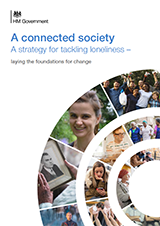A connected society: A strategy for tackling loneliness

Up to a fifth of all UK adults feel lonely most or all of the time with evidence showing loneliness can be as bad for health as obesity or smoking.
Three quarters of GPs surveyed have said they are seeing between one and five people a day suffering with loneliness, which is linked to a range of damaging health impacts, like heart disease, strokes and Alzheimer’s disease. Around 200,000 older people have not had a conversation with a friend or relative in more than a month.
The practice known as ‘social prescribing’ will allow GPs to direct patients to community workers offering tailored support to help people improve their health and wellbeing, instead of defaulting to medicine.
As part of the long-term plan for the NHS, funding will be provided to connect patients to a variety of activities, such as cookery classes, walking clubs and art groups, reducing demand on the NHS and improving patients’ quality of life.
This strategy sets out the approach to tackling loneliness in England. It marks a shift in the way we see and act on loneliness, both within government and in society more broadly.
It builds on the work of many organisations and individuals over the years, and is government’s first major contribution to the national conversation on loneliness and the importance of social connections. This strategy is an important first step, government is also committed to long-lasting action to tackle the problem of loneliness.
